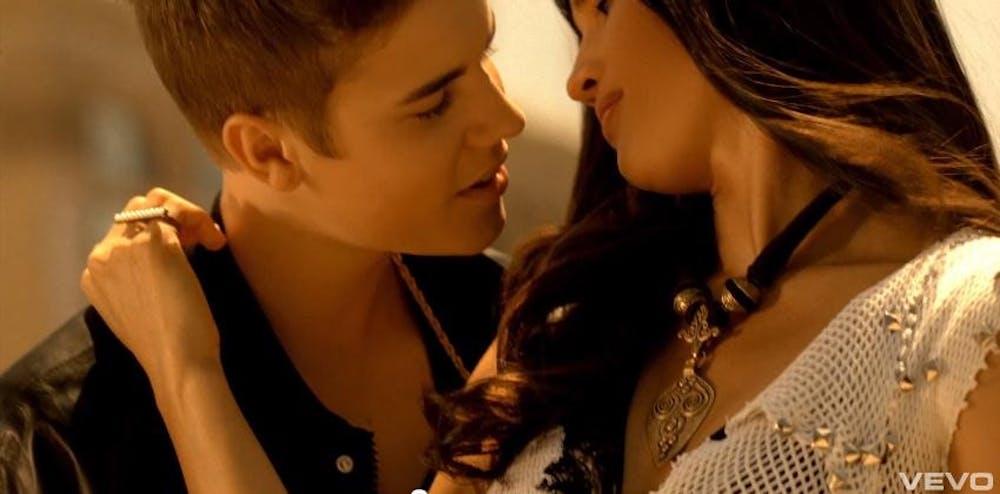Without a number-one Billboard single to his name, Justin Bieber tops the true measure of today’s music popularity — YouTube.
The 18-year-old icon’s YouTube channel has more than 1.4 million subscribers, 2.5 billion video views and the most-viewed video of all time, his first hit single “Baby.” But Justin Bieber isn’t the latest big thing. He’s the same thing that ever was.
Canada’s hottest export is one of the United States’ favorite spokespersons for the good old American Dream. It keeps Bieber in the spotlight and the Dream alive.
Bieber’s rise from obscurity to fame by way of YouTube has more than something to do with his sustained popularity. It’s an “American Idol” rags to riches narrative where natural talent supposedly earns you your wealth and place in history.
Our idols say a lot about our national imagination.
Bieber embodied the purest of pure as a child singer, seeming not much older than a baby when singing about his own “Baby” in a prepubescent voice.
The video features playful bowling alley rivalry between genders that only hints at the sexuality of his later releases, but stays true to his most consistent theme — love.
His innocuous lyrics always have a monogamous and heterosexy overtone, declaring that he just needs somebody to love, he’ll buy you anything and you’ll always be his. He fit perfectly into the desexualized ideal of normative children, which still promises to one day provide capitalist romance and long-term commitment.
As proved by the staggering amount of times the video has been rewatched, we love to pretend this fantasy is real, and dream about a relationship with Bieber. By replaying Justin Bieber videos, we recreate something that never was, will be or can be.
This is online video fantasy, where his huge fan following connects with the superstar. There are countless tweens who monastically devote themselves to the fantasy of marrying Bieber, which resulted in the seriously amazing “Marry Justin Bieber” online game.
His videos can be dangerous, too — as they revive the same fears about childhood sexuality everyone was talking about when Britney and Miley were still controversial.
When Bieber overtly tackles sexuality or appears sexual himself, the reaction is less ecstatic and more anxious. The mainstream nods its head to cutesy depictions of romantic longing but expresses outrage at the explicit or implicit fulfillment of that longing.
The sexy “Boyfriend” video teasers scared enough people that I wonder if the concept was switched out for the more vanilla and “real” version of the video.
The trick for Bieber will be to transition from a puritan child singer to a convincingly sexual adult singer without shocking people out of their adoration. If he makes it through the awkward transition into adulthood, Bieber will join the likes of Michael Jackson and Justin Timberlake as child-to-adult superstars.
From there, he can sing more of the fantasy life of pure love, sexual pleasure and wealth that enchants listeners. His moment of truth arrives later this month with the release of his third album, “Believe.”
Whatever propelled him into the American music mainstream, there’s no denying the salience of his project. The teen sensation has nearly 23 million Twitter followers, and every tweet of his I’ve read is retweeted and/or favorited by more than 50 followers.
Featured on the cover of Forbes, which named Bieber the third most powerful celebrity in the world, his sharp suit and hairdo can’t quite overcome how baby-faced he still appears.
This is an artist who sold out all his U.S. tour dates within an hour of going on sale. If you don’t believe in the popular power of the American Dream, you can’t deny how many Beliebers who do.
Record label execs probably spend more time than we can imagine trying to figure out what will be well-received in dominant culture. They want to find the next big thing, and they want to be the ones selling it. Talent scouts and industry music producers comb the country for easily digestible and sellable faces and voices. Bieber is “it.” Why?
Is it the odd free concert that convinces his younger fans he doesn’t care about money? Is it meeting and greeting Beliebers with neurological disorders? Is it his drug-free public record? The conventional beauty? The catchy melodies? Is it the voice?
It’s all of that, and his ability to make us belieb in the American Dream. We’ve watched stories and heard songs like Bieber’s before, but he’s making the same-old same-old look and sound sexier than ever.
By Patrick Beane
We've seen this before

Get stories like this in your inbox
Subscribe





